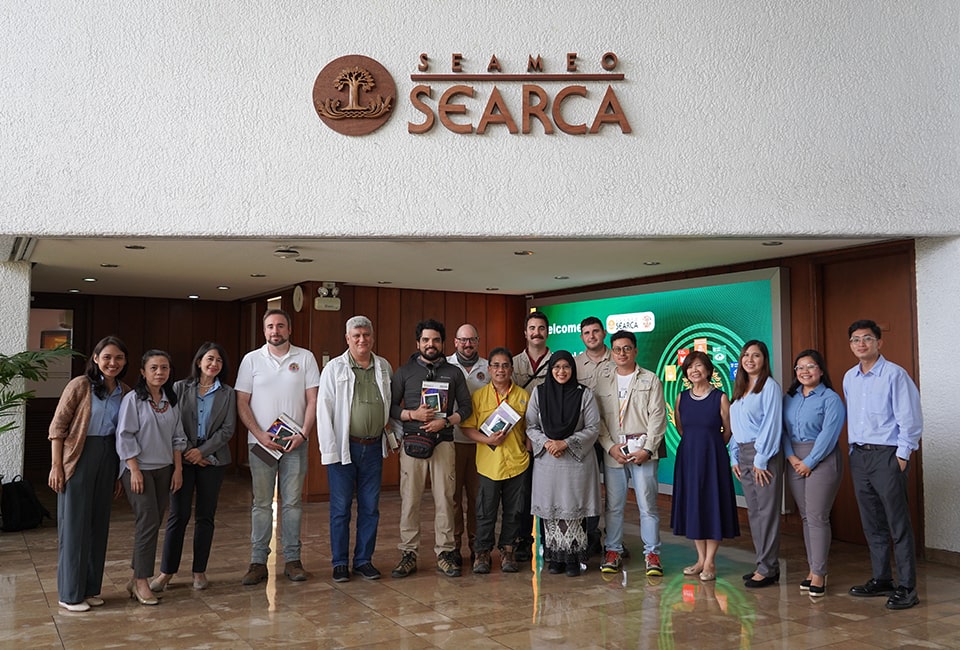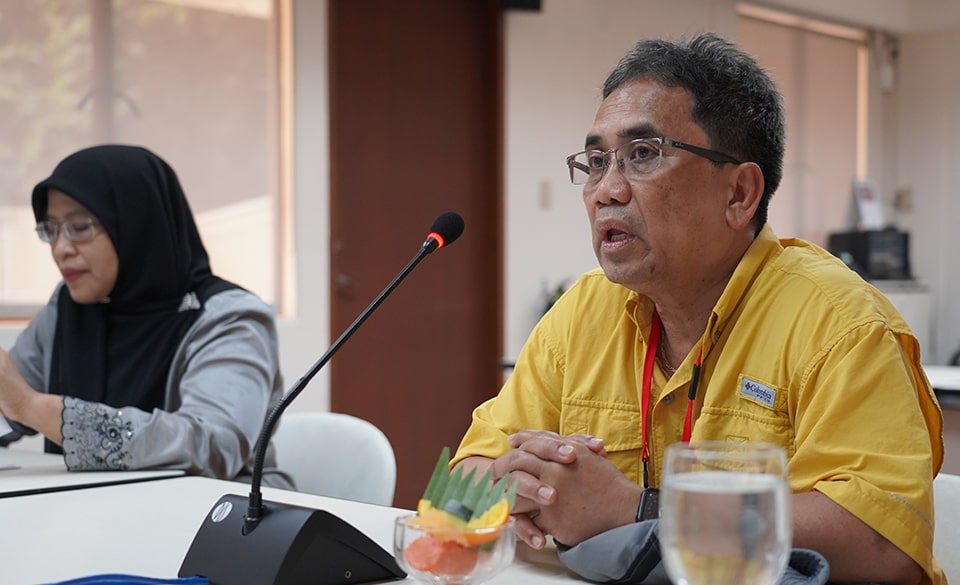A Sensient Colors, LLC delegation led by Dr. Vergel Concibido, director of agronomy, visited the Southeast Asian Regional Center for Graduate Study and Research in Agriculture (SEARCA) on 1 February 2024 to gain insights on its scholarship offerings and innovation-focused projects.
 The SEARCA delegation led by Dr. Nur Azura binti Adam, SEARCA deputy director for programs, poses with the Sensient Colors, LLC delegation.
The SEARCA delegation led by Dr. Nur Azura binti Adam, SEARCA deputy director for programs, poses with the Sensient Colors, LLC delegation.
Sensient Colors, LLC is a business unit under the Sensient Technologies Corporation, a leading global manufacturer and supplier of natural and synthetic color solutions for food and beverage, cosmetic, pharmaceutical, and industrial markets. They have previously partnered with SEARCA in Innovation Olympics 2.0, an agri hackathon, wherein young innovators developed solutions to the challenges faced by urban and rural smallholder vegetable farmers.
During the meeting, the visitors were given an overview of SEARCA's mandate and offerings. Ms. Sharon Malaiba, unit head of the Partnerships Unit (PU), introduced the Center's core programs.
Ms. Malaiba shared the Education and Collective Learning Department's scholarship programs and their eligibility requirements. In addition, Dr. Nur Azura Binti Adam, SEARCA deputy director for programs, discussed the Center's joint scholarship grants, citing the collaborations with the German Academic Exchange Service (DAAD), Tokyo University of Agriculture (Tokyo NODAI), National Taiwan University, and Sejong University in Korea. Dr. Nur also highlighted SEARCA and the European Commission ERASMUS+ Capacity Building in Higher Education's three-year initiative titled Postgraduate Micro-Credentials on Food Security and Climate Change, which utilizes digital technologies to develop and offer online modules that aim to address food security and climate change.
In response, Dr. Concibido shared that Sensient Colors, LLC offers scholarship opportunities at the University of Padjadjaran in Indonesia. Some of these slots are open to Filipinos 35 years or below, with research focusing on color and flavor crops.
Ms. Malaiba presented some of the Research and Thought Leadership Department's past engagements with the United States Department of Agriculture (USDA) in forums, seminars, workshops, and roundtable discussions, mostly on biotechnology. She also informed the visitors of SEARCA and Bayer CropScience Philippines' forum on Philippine yellow corn.
Meanwhile, Ms. Lichelle Carlos, a program specialist of SEARCA's Emerging Innovation for Growth Department (EIGD), gave a rundown of EIGD's initiatives, one of which was the Innovation Olympics 2.0, which was won by Team AIRIN's automated irrigation and nutrient management system and Project Angat's vertical farming system.
Ms. Carlos also discussed EIGD's initiative in agrobotics education. SEARCA and the Central Luzon State University conducted a training workshop on VEX robotics. Aside from that, the Center also welcomes visitors and hosts ideation sessions in its SEARCA Hub for Agriculture and Rural Innovation for the Next Generation (SHARING) and SHARING Café, which serve as learning spaces for agricultural innovation.
On top of that, Ms. Carlos introduced the Grants for Research towards Agricultural Innovative Solutions (GRAINS). GRAINS provides starter funds to researchers, scientists, inventors, and agripreneurs to scale up their technology or innovation model. She underscored notable projects under GRAINS, such as the University of San Carlos in Cebu, Philippines's innovation on bioplastic films from shrimp waste materials; a government-led project on big weather data in Thailand; and a Singapore-based startup's diagnostic kit that detects the presence of disease in shrimp farm water samples. Another GRAINS project is with SpaceCrop Technologies, an agricultural software company that helps farms manage irrigation and increase crop resiliency using satellite data and artificial intelligence.
Lastly, she also showcased the Center's projects on carbon farming, one of which was its partnership with Newfields Consulting Ltd. and Macon Ltd. on the Training-Workshop Series on Carbon Wise Rice-based Farming. She also mentioned SEARCA's Rice Straw Biogas Hub (RSBH) initiative, led by a United Kingdom-registered startup, Straw Innovations. RSBH aimed to generate biogas as clean energy from waste rice straw and provide innovative technology services for rice farmers.
 L-R: Dr. Nur with Dr. Vergel Concibido, Sensient Colors, LLC director of agronomy
L-R: Dr. Nur with Dr. Vergel Concibido, Sensient Colors, LLC director of agronomy
The visitors were welcomed by Dr. Nur. With them in the meeting were Ms. Corinta Guerta, technical advisor to the director; Ms. Malaiba; Ms. Carlos; and key staff from PU and the Office of the Deputy Director for Programs.
